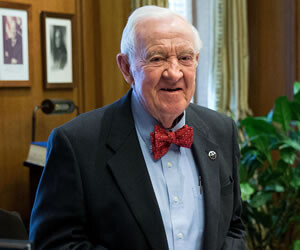

Last Updated: 10 Apr, 2023 | Views: 695
Age: 99
Profession: Lawyer
Other Profession(s): Jurist
Famous For: Former Associate Justice of the Supreme Court of the United States
Higher Education: University of Chicago (AB), Northwestern University (JD)
About (Profile/Biography)
John Paul Stevens was an American lawyer and jurist who served as an Associate Justice of the United States Supreme Court from 1975 until his retirement in 2010. During his time on the court, Stevens was known for his independent thinking, his commitment to justice and equality, and his advocacy for individual rights.
John Paul Stevens Education
Paul studied at the University of Chicago, where in 1941 he received a Bachelor of Arts in English. Stevens later served in the US Navy during World War II and was awarded a Bronze Star for his efforts. He enrolled in Northwestern University Law School after the war, where he graduated with a Juris Doctor in 1947.
John Paul Stevens Early Legal Career
Stevens began his legal career as a law clerk for Justice Wiley Rutledge of the US Supreme Court after receiving his law degree. He then worked in private practice in Chicago for several years before being appointed as a federal judge on the United States Court of Appeals for the Seventh Circuit in 1970.
John Paul Stevens Supreme Court Justice
In 1975, President Gerald Ford appointed Stevens to the United States Supreme Court, where he served for 35 years. Stevens was known for his moderate and independent views, and he often served as a swing vote on the court.
He was a fervent supporter of individual rights and published a number of influential essays on subjects like the death penalty, campaign finance reform, and affirmative action.
At the age of 90, Stevens stepped down from the Supreme Court in 2010. He served on the court for the third-longest period of time in its history, and his contributions to American law were universally acknowledged and honoured.
John Paul Stevens Legacy
John Paul Stevens' legacy is one of integrity, independence, and dedication to the principles of justice and equality. His opinions and dissents on the Supreme Court reflected his commitment to individual rights and the rule of law, and his contributions to American jurisprudence continue to influence legal thinking and practice today. Stevens was also known for his humility and collegiality, and he was widely respected by his colleagues.
Wait!
Here're some popular profiles for you.


